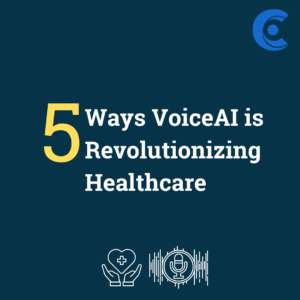5 Ways VoiceAI is Revolutionizing Healthcare

1. Medical Documentation:
Healthcare providers spend significant time on medical documentation. VoiceAI can automate this process by transcribing medical dictation into electronic health records (EHRs). By reducing the risk of errors and saving time, the quality of care can be improved. Dragon Medical One is a voice recognition software developed by Nuance Communications specifically for the healthcare industry.
2. Patient Engagement:
VoiceAI is used to improve patient engagement and satisfaction. Voice-enabled devices can remind patients to take their medication, schedule appointments, and provide education on their condition. An example would be the Orbita Platform, which allows healthcare providers to create voice-enabled apps accessed through smart speakers or other devices.
3. Diagnosis and Treatment:
VoiceAI can assist in diagnosing and treating medical conditions. Devices enabled with VoiceAI can identify variations in a patient’s voice that could suggest a respiratory condition like asthma or chronic obstructive pulmonary disease (COPD). VoiceAI can also assist in treating speech and language disorders, such as stuttering or aphasia. Israeli startup Beyond Verbal has developed a voice analysis platform that detects changes in a person’s voice.
4. Remote Patient Monitoring:
VoiceAI can be used for remote patient monitoring, particularly for patients with chronic conditions. Voice-enabled devices can track a patient’s vital signs, such as heart rate and blood pressure, and alert healthcare providers of any concerning changes. LifePod, a startup, has created a device enabled with VoiceAI, which can be utilized for monitoring the health of independent senior citizens at home.
5. Care Coordination:
VoiceAI can facilitate care coordination between healthcare providers, improving communication and collaboration. Voice-enabled devices can share patient information, coordinate care plans, and schedule appointments. The startup Aiva Health has developed a voice-enabled assistant that can be used by patients in hospitals and long-term care facilities to communicate with their healthcare providers and caregivers.
